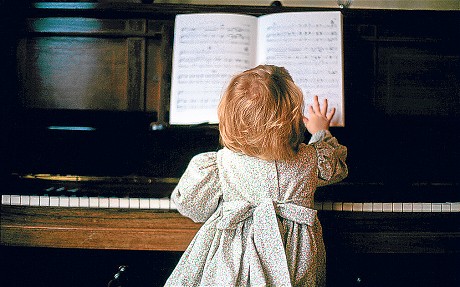Blog
Memorizing Music

Memorizing is a necessary skill to enhance learning and retention. For children taking instrumental music lessons, memorizing their music will help to improve memory giving confidence in the child’s ability to remember. Young children should always be encouraged to memorize all their repertoire pieces. Compared to pieces learnt at an older age, pieces memorized in the early years are practically never forgotten. And, even if forgotten, are most easily recalled.
Walter Gieseking, a well-known 20th century pianist, was renowned to be able to memorize entire piano concert pieces whilst on a plane flight. Did Gieseking do impossible and magical tricks ? Definitely not ! A vast majority of children we know probably had a hard time memorizing music. Memorizing should not be difficult or frustrating using the right approach. Follow some simple steps and put memory slips at bay. Not convinced ? Try these memory techniques.
Look at Music as a whole
Before beginning to play, firstly, study the piece. Ask the child about the key signature, time-signature, dynamics, any striking features ? Visualize the piece through silent reading. The child will soon discover each piece as not merely a series of notes to memorize but as a coherent musical structure to understand.
Look for Associations
Find patterns in the piece of music. They are everywhere in music. Find them and label them. Look for groups of notes that make harmonic sense or pattern, a scale-like structure, an arpeggio. and commit them to memory.
Memorize right the first time
Always memorize everything right the first time. By the time you get to the end of the piece, it will be completely memorized and performance ready. There will never be a need to go back and add dynamics, or anything else. Because of this the child will find learning music very much faster than before.
Play very slowly
An important way to reinforce memory is, at the initial stage to play very slowly, less than half speed. Slow speed reduces the dependence on hand memory and supplant it with "real memory". The stimulation from the piano sound is also absorbed internally. Always be at least a split second ahead of the music . As a general rule, think about one bar ahead. Play it right the first time, complete with all the dynamics and other articulations.
Break it up into Small Sections
If the music is a little long, it's always helpful to divide it into manageable sections. Memorize small clusters at a time. Brian Specialists call this “chunking”. Look for an interesting phrase or a couple of measures. Remember again to look for patterns and associations within that phrase.
Repeat
Repeat a few times. Learning by repetition helps to form connection of synapses in brain cells.
Sleep
If the child gets bored repeating a section over and over again, move on. Sleep over it ! Sleep is the next best thing for memory retention. Do the same thing again the next time. Too many children waste hours practicing sections that will never get any better at one sitting . By sleeping our brain solidifies everything we tried to memorize. Specialists call this consolidation.
Naps
Studies also show that naps can have a similar effect on memory as a good sleep. Memorizing something followed by a quick nap may be very effective. The nap in between can replace the consolidation that is needed with sleep.
Mind Maps
For the more innovative, making a colorful mind chart with the notations can help to concretize memorization. A little creativity goes a long way towards making the task fun and rewarding.
Conclusion
Admittedly, these activities do take a lot of time and it is easy to lose momentum and to stop memorizing. Following a few simple routine provides greater continuity besides establishing good memorizing habits.
Written by Mr Thomas Tan
Master Trainer and Lecturer


 Choosing a music school that's right for you or your child can be tedious. Use this guide to find out what are the top 10 questions you should ask a music school before enrolling!
Choosing a music school that's right for you or your child can be tedious. Use this guide to find out what are the top 10 questions you should ask a music school before enrolling!